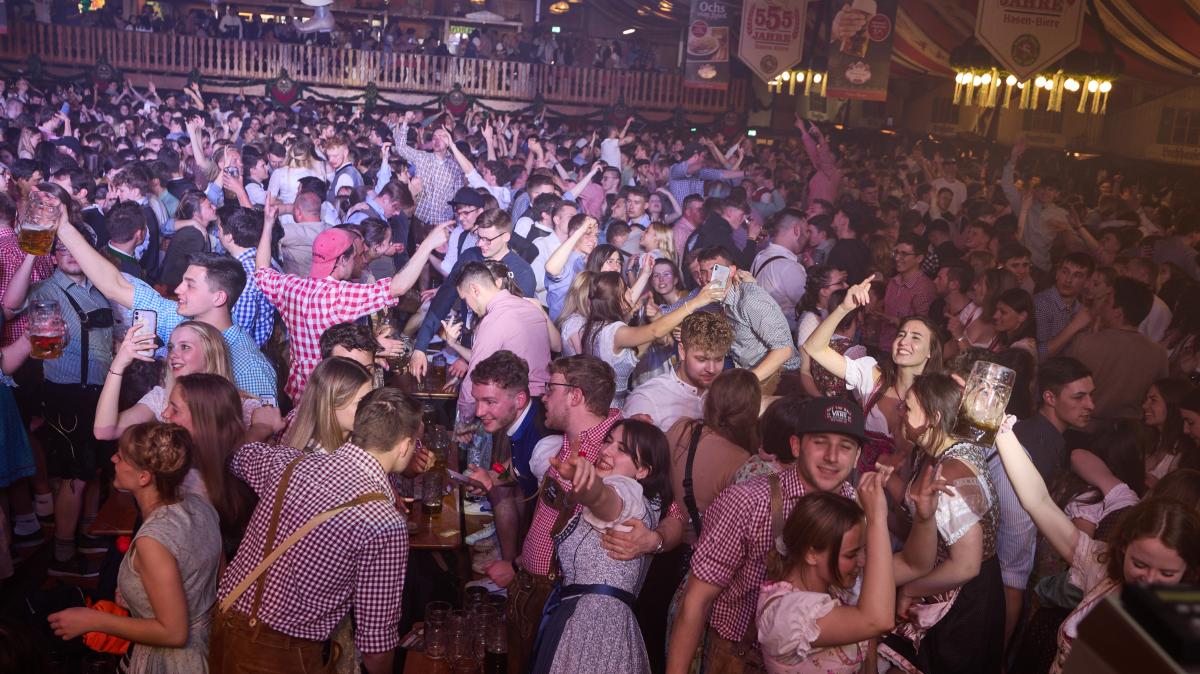The party goes on, at least for some. Party-goers flock to dance floors and beer tents. Experts explain what to watch out for.
Closed due to overcrowding, and not just on one evening: Full marquees on the Plärrer in Augsburg show that many people are already in party mode again after the corona loosening in recent months. Exuberant celebrations are not only held in the beer tent. Stefan Egger, who runs the Club PM in Untermeitingen at Augsburg operates, says: “People are partying more exuberantly than ever before. They haven’t gotten used to sitting on the couch and standing at the gas station.” It is a pleasure for him to see that. But have pandemic inertia and caution for fear of contagion really gone? The psychologists at the Rheingold Institute in Cologne came to a different conclusion.
–
“People are partying more exuberantly than ever before.” Stefan Egger runs the PM discotheque in Untermeitingen.
Her research has revealed that the everyday life of some people is characterized by restraint. The reason is a mixture of fear of war and “Melancovid”, so one of Corona induced melancholy. Specifically, the text of the study says: “Only almost a quarter of people want to return to the fullness of life and willingness to take risks of the pre-corona period.” On the other hand, 27 percent stated that they wanted to be more reserved in dealing with people in the future. Not even every one or every tenth wants to celebrate particularly boisterously in order to satisfy the pent-up demand. The findings come from a depth psychological study with 40 participants and a survey with answers from 1000 Germans.
Party after corona pandemic: feeling of threat remains
Psychologist Birgit Langebartels conducts research for the Rheingold Institute. Despite all the melancholy, she observes an urge to celebrate without worrying, similar to how Egger describes it. “We have an incredible longing for this lightness,” says Langebartels. “At the same time, we have to relearn that.” While a few years ago we would have lived in a world in which many things seemed perfect, the threat experienced since then would have increased significantly – from the threat of terrorism, authoritarian heads of state and finally from Corona and the war in Ukraine. But should this constant sense of threat keep people from social interactions? Four tips for getting back into the nightlife.
1. Just do it
Club operator Egger says: “It’s time to let life be life again and dive into nightlife.” Life is too great to just wait and see. For many, there is a need to hide everyday life at the weekend and forget the stress. Langebartels also recommends pushing yourself to social gatherings. For the younger ones in particular, partying is not just exuberance, but an important step in their development. “If they don’t do that, they’re missing something.” It’s about testing boundaries. “Locking yourself up in the long run can’t be good for any development.”
2. Don’t rush things
Sounds like a contradiction to the first point, but it isn’t. A bit of self-control doesn’t hurt, but if you don’t feel comfortable with it, you don’t have to be in close proximity to hundreds of people. Langebartels recommends: “Take small steps.” It doesn’t have to be the huge festival directly, you can also slowly venture onto external terrain again, for example meet up with five friends in your own apartment. “You can also continue to follow the AHA formula and ask people you are meeting to do so when you feel more comfortable.” Egger says that anyone who doesn’t yet feel safe in nightlife should wait and decide for themselves when the right time is. “Everyone should live their own rhythm.”
Also read about this
3. Stay optimistic
There will always be setbacks such as canceled events. The permanent mood of crisis in recent years has led to a disappointment prophylaxis, explains Langebartels. The question “who knows what will happen next?” discourages some people from medium or long-term plans. It is about being flexible and not falling into pessimism, but maintaining a healthy optimism. “It’s normal life that things don’t always work at the push of a button,” says the psychologist. But the more flexible you are, the better you can adapt to new situations. And stay optimistic. Reason for this is also given by Langebartel’s assessment that the indolence and fears that are still keeping many people from celebrating will probably not last longer than a year.
4. Don’t misbehave
Too much alcohol, physical harm, insults against the police, evictions every minute – that was what happened on the Plärrer last weekend. The correct behavior in public seems to be a bit rusty for some. Langebartels says: “That has to be practiced again.” After all: Club operator Egger does not observe increasing brutalization after the lockdowns. Since it was allowed to open again, there have been hardly any negative incidents.
–


